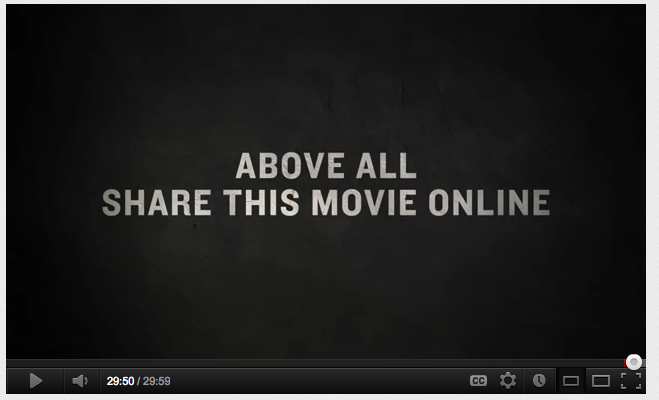RB 195: Can 100 Million Viewers Save a Child?
March 23rd, 2012
Listen: or download | …also in Ogg
The #Kony2012 video, and accompanying campaign and meme, has done a lot to raise awareness.
Of WHAT exactly, it’s hard to tell.
The intended target for attention — the Ugandan warlord Joseph Kony — is certainly a big one.
But the video was flawed. In favor of simplicity it glossed over crucial facts and advocated passionately for questionable solutions, in the end bringing more critical attention back to Invisible Children, the charismatic American youth group behind the campaign.
Most of all the explosion of Kony 2012 has raised awareness about sensitivities around the politics of intervention in Africa, and the utility of digital activism and fundraising for awareness campaigns in the United States.
Today we hear from four guests:
- Rosebell Kagumire, a Ugandan journalist, about where Joseph Kony is now, and how Ugandans are responding to the new attention
- Gilad Lotan, a network researcher, about what he found when he dug into the data on how the Kony2012 meme spread
- Ethan Zuckerman, a founder of Global Voices, on whether simple narratives can ever help solve complex issues
- and Amanda Taub, a blogger and human rights expert, on what Invisible Children could have done differently.

Listen up! Comment on the show! Tweet us!
Reference Section:
Rosebell Kagumire’s blog
Elliott Prasse-Freeman clarifying some historical roots of Kony’s presence in Central Africa, and past attempts to stop him
Sara Weschler, an American currently living in Gulu, Kony’s hometown, on the local response
Teju Cole on what he calls the White Savior Industrial Complex, and the dangers of listening to Invisible Children
Interviews with former child soldiers of Joseph Kony’s Lord’s Resistance Army from Human Rights Watch
Suggested Standard Operating Procedures for journalists working with victims and survivors on tragic events from the Dart Center for Journalism and Trauma
Lindsay Branham and Jocelyn Kelly on engaging the voices of Africa on Kony
The best of the #WhatILoveAboutAfrica meme
Norbert Mao, a lawyer and politician from Northern Uganda, on his experience having met Kony
Taylor Brodarick on whether star power can save the world
Uganda’s Prime Minister responds to Kony2012 with some positive messages on Uganda
Zeynep Tufecki on slacktivism and the cognitive dissonance between Invisible Children’s good intentions and their poor execution
Northern Uganda, Visible: Photos from Uganda curated by Glenna Gordon
Why Your Non-Profit Won’t Make a Kony 2012, Jason Mogus on why established non-profit advocacy and awareness groups are unable to replicate Invisible Children’s success
The archive of a recent Amnesty International Q&A on Kony, the situation in Central Africa, and military intervention
Solving War Crimes With Wristbands: The Arrogance of ‘Kony 2012’, the Atlantic post from Amanda Taub and Kate Cronin-Furman of Wronging Rights
Ethan Zuckerman’s two most recent posts on the Kony 2012 campaign, responses, and thoughts on oversimplifying messages in complex issues
Gilad Lotan’s and Social Flow’s data visualizations of the spread of the Kony2012 meme on Twitter
Analysis of tactics and origins of the Invisible Children group from Henry Jenkins’ research team at the University of Southern California
A report from the response in the Northern Ugandan town of Lira to the Kony2012 video
Other responses from bloggers and tweeters in Uganda and around Africa
A collection of some responses in the NYTimes ‘Room for Debate’ series
This week’s episode produced and edited by Daniel Dennis Jones with Frances Harlow
Creative Commons licensed music by MorganTJ
Entry Filed under: audio,radioberkman
1 Comment Add your own
Leave a Comment
Some HTML allowed:
<a href="" title=""> <abbr title=""> <acronym title=""> <b> <blockquote cite=""> <cite> <code> <del datetime=""> <em> <i> <q cite=""> <s> <strike> <strong>





1. AfroCritic | November 23rd, 2015 at 4:29 am
Missing from all this discussion of Joseph Kony and his infamous Lords Resistance Army is the elephant in the room, which is corruption in Africa. The LRA insurgency started very small and could have been nipped in the bud but for corruption in the Ugandan government and the armed forces.Today the rebellion is international. The same is true for the Boko haram insurgency in Nigeria
We shouldn’t have ever needed an international media campaign to find Kony and bring him to justice. The Western world can do a lot to expose the corrupt in Africa and to fight the hemorrhage of public funds (and the resulting lack of public services and the economic exclusion) which is whats helping to start these sorts of insurgencies.Groups like the LRA and Boko Haram find a convenient cover in religion to sustain these wars, but underneath there are social and economic grievances.